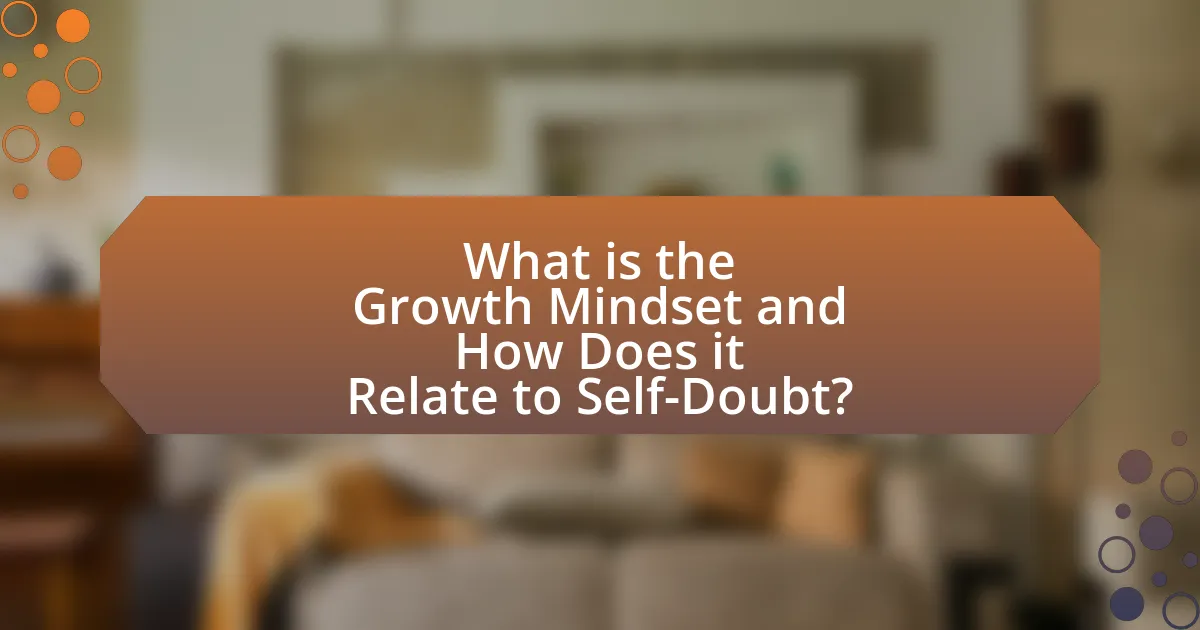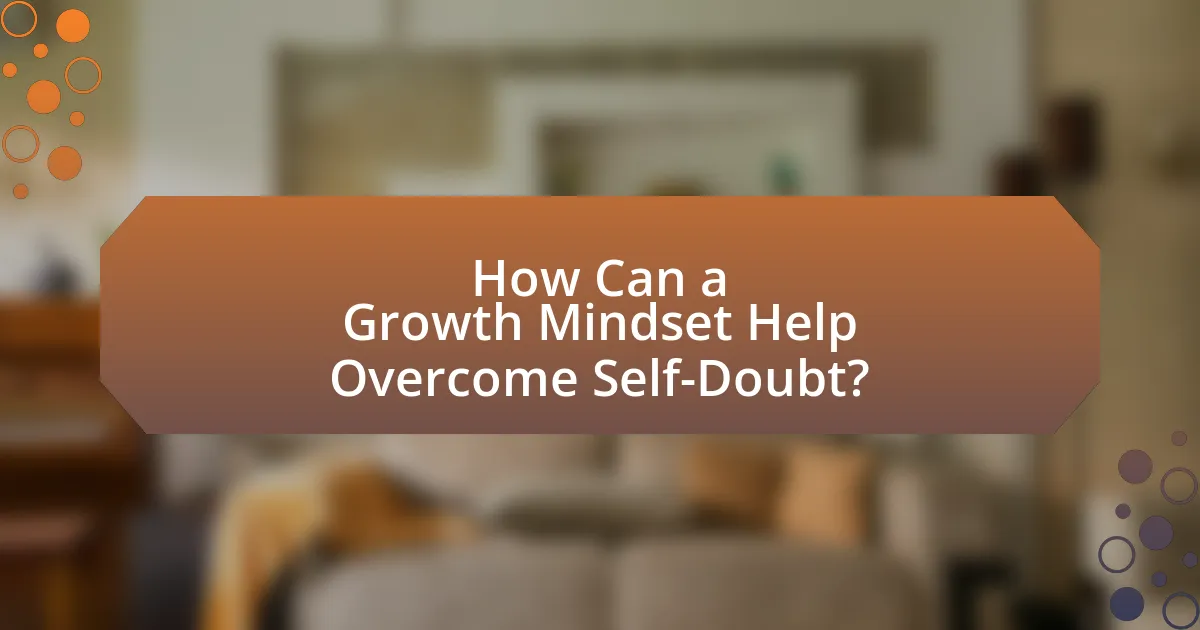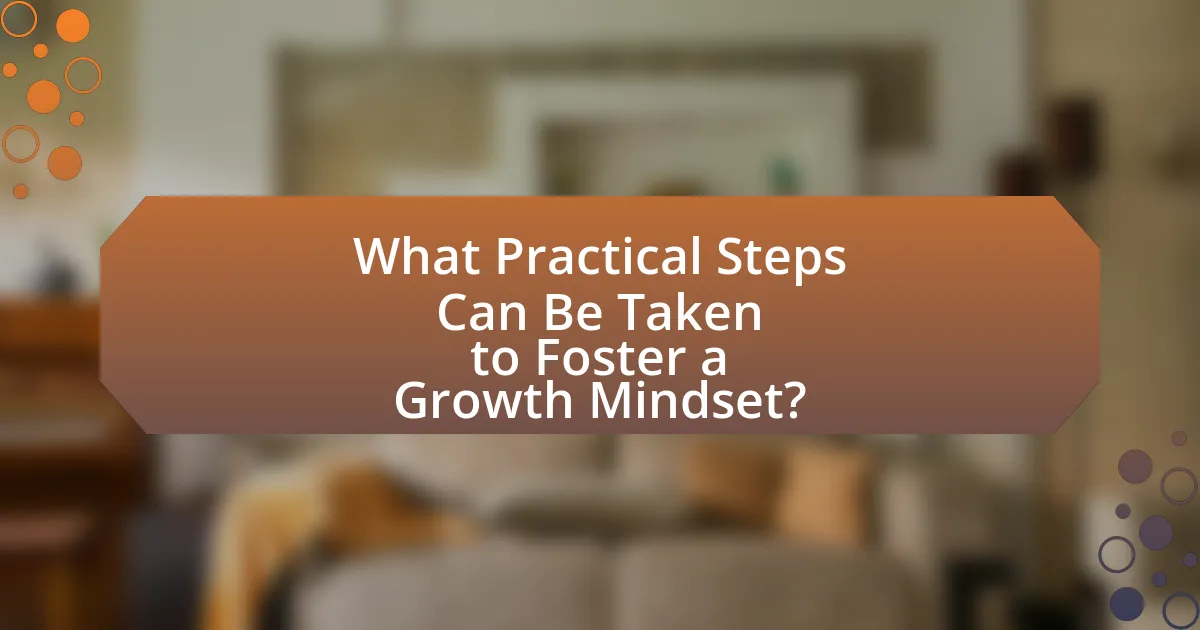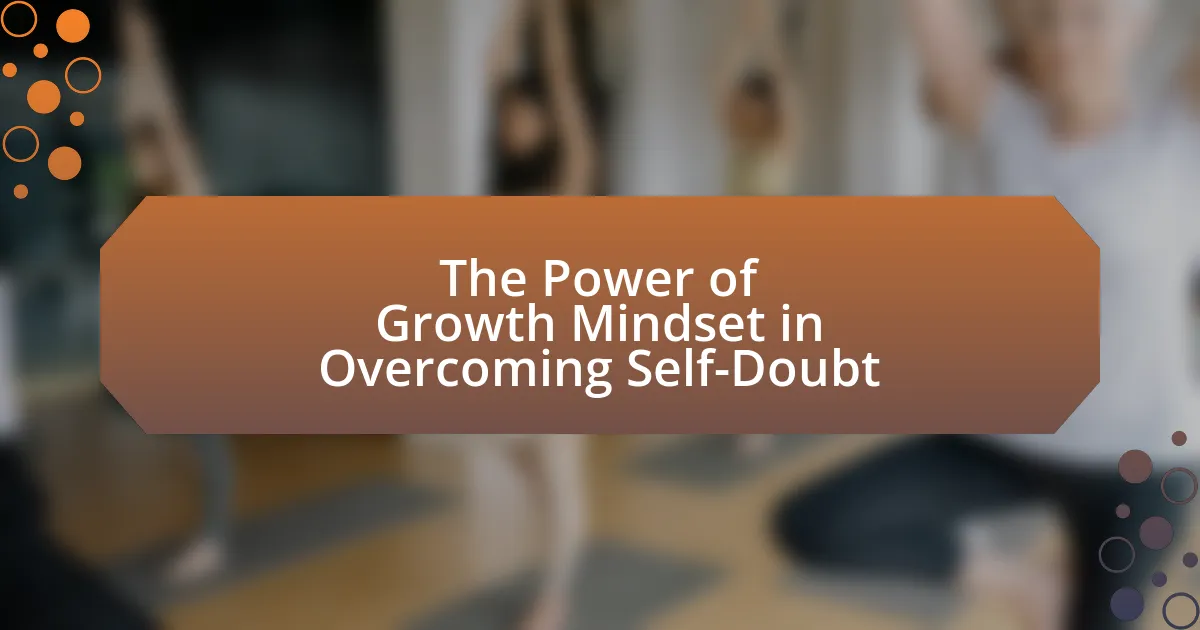The article focuses on the concept of the growth mindset and its significant role in overcoming self-doubt. It explains that a growth mindset is the belief that abilities and intelligence can be developed through effort and learning, contrasting it with a fixed mindset, which views abilities as static. Key characteristics of a growth mindset include resilience, embracing challenges, and viewing failures as learning opportunities. The article discusses the psychological effects of self-doubt, its impact on personal and professional growth, and practical strategies to cultivate a growth mindset, such as setting realistic goals, seeking feedback, and reframing negative thoughts. Additionally, it highlights the importance of mentorship and daily practices in reinforcing a growth mindset to enhance self-efficacy and reduce self-doubt.

What is the Growth Mindset and How Does it Relate to Self-Doubt?
The growth mindset is the belief that abilities and intelligence can be developed through dedication and hard work. This perspective fosters resilience and a love for learning, which are essential for overcoming challenges and self-doubt. Research by Carol Dweck, a psychologist at Stanford University, demonstrates that individuals with a growth mindset are more likely to embrace challenges and persist in the face of setbacks, thereby reducing feelings of self-doubt. In contrast, those with a fixed mindset may view their abilities as static, leading to increased self-doubt when faced with difficulties. Thus, adopting a growth mindset can significantly mitigate self-doubt by encouraging individuals to view failures as opportunities for growth rather than as reflections of their worth.
How does a growth mindset differ from a fixed mindset?
A growth mindset differs from a fixed mindset in that individuals with a growth mindset believe their abilities and intelligence can be developed through effort and learning, while those with a fixed mindset believe their abilities are static and unchangeable. Research by psychologist Carol Dweck indicates that people with a growth mindset are more likely to embrace challenges, persist in the face of setbacks, and view effort as a path to mastery, whereas individuals with a fixed mindset may avoid challenges and feel threatened by the success of others. This distinction is crucial in understanding how mindset influences personal development and resilience in overcoming self-doubt.
What are the key characteristics of a growth mindset?
A growth mindset is characterized by the belief that abilities and intelligence can be developed through dedication and hard work. This perspective fosters resilience, encourages learning from criticism, and embraces challenges as opportunities for growth. Research by psychologist Carol Dweck highlights that individuals with a growth mindset are more likely to persist in the face of setbacks and view effort as a path to mastery, which supports their ability to overcome self-doubt.
How does a fixed mindset contribute to self-doubt?
A fixed mindset contributes to self-doubt by fostering the belief that abilities and intelligence are static traits, leading individuals to avoid challenges and fear failure. This avoidance reinforces feelings of inadequacy when faced with obstacles, as individuals with a fixed mindset often interpret setbacks as a reflection of their inherent limitations. Research by Carol Dweck, a psychologist at Stanford University, demonstrates that individuals with a fixed mindset are more likely to experience anxiety and self-doubt because they equate effort with a lack of ability. Consequently, this mindset creates a cycle where self-doubt inhibits growth and learning, further entrenching the belief that one cannot improve or succeed.
Why is overcoming self-doubt important for personal development?
Overcoming self-doubt is crucial for personal development because it enables individuals to pursue goals and embrace challenges without the fear of failure. When self-doubt is diminished, individuals are more likely to take risks, seek new opportunities, and engage in continuous learning, which are essential components of personal growth. Research indicates that a growth mindset, characterized by the belief that abilities can be developed through dedication and hard work, significantly reduces self-doubt and fosters resilience. For instance, a study by Dweck (2006) in “Mindset: The New Psychology of Success” demonstrates that individuals with a growth mindset are more likely to view challenges as opportunities for growth rather than threats, leading to greater achievement and fulfillment in their personal and professional lives.
What are the psychological effects of self-doubt?
Self-doubt can lead to significant psychological effects, including increased anxiety, depression, and decreased self-esteem. Individuals experiencing self-doubt often struggle with negative self-talk, which can perpetuate feelings of inadequacy and hinder personal growth. Research indicates that self-doubt is linked to a fear of failure, which can result in avoidance behaviors and reduced motivation to pursue goals. A study published in the Journal of Personality and Social Psychology found that self-doubt negatively impacts performance and decision-making, as individuals may second-guess their abilities and choices. This cycle of self-doubt can create a barrier to developing a growth mindset, which is essential for overcoming challenges and fostering resilience.
How can self-doubt hinder personal and professional growth?
Self-doubt can significantly hinder personal and professional growth by limiting an individual’s willingness to take risks and pursue opportunities. When individuals experience self-doubt, they often avoid challenges, fearing failure or negative evaluation, which restricts their ability to learn and develop new skills. Research indicates that self-doubt can lead to decreased motivation and lower performance levels, as individuals may not fully engage in tasks or may procrastinate due to fear of inadequacy. For instance, a study published in the Journal of Personality and Social Psychology found that self-doubt negatively impacts goal-setting and achievement, as individuals with high self-doubt are less likely to set ambitious goals and more likely to give up when faced with obstacles. This cycle of avoidance and reduced effort ultimately stifles both personal and professional advancement.

How Can a Growth Mindset Help Overcome Self-Doubt?
A growth mindset can help overcome self-doubt by fostering resilience and encouraging a focus on learning rather than perfection. Individuals with a growth mindset view challenges as opportunities for growth, which reduces the fear of failure that often accompanies self-doubt. Research by Carol Dweck, a leading psychologist in this field, shows that embracing a growth mindset leads to greater motivation and persistence in the face of setbacks. This mindset shift allows individuals to reframe their self-doubt as a natural part of the learning process, ultimately enhancing their confidence and performance.
What strategies can be employed to cultivate a growth mindset?
To cultivate a growth mindset, individuals can employ strategies such as embracing challenges, learning from criticism, and persisting in the face of setbacks. Embracing challenges encourages individuals to step outside their comfort zones, which fosters resilience and adaptability. Learning from criticism allows for constructive feedback to be viewed as an opportunity for improvement rather than a personal attack, promoting a continuous learning process. Persisting in the face of setbacks reinforces the belief that effort leads to mastery, as evidenced by research from Stanford psychologist Carol Dweck, who found that individuals with a growth mindset are more likely to achieve success through perseverance and effort.
How can reframing negative thoughts contribute to a growth mindset?
Reframing negative thoughts contributes to a growth mindset by transforming limiting beliefs into opportunities for learning and development. This cognitive shift allows individuals to view challenges as chances to improve rather than insurmountable obstacles. Research by Carol Dweck, a leading psychologist in the field of motivation, indicates that adopting a growth mindset enhances resilience and fosters a greater willingness to embrace challenges. By actively changing the narrative around negative thoughts, individuals can cultivate a more adaptive approach to setbacks, ultimately leading to increased motivation and achievement.
What role does self-reflection play in developing a growth mindset?
Self-reflection is crucial in developing a growth mindset as it enables individuals to assess their thoughts, behaviors, and learning processes. By engaging in self-reflection, individuals can identify their strengths and weaknesses, recognize areas for improvement, and understand their responses to challenges. Research by Dweck (2006) highlights that individuals with a growth mindset view failures as opportunities for learning, which is facilitated by reflective practices. This process encourages a continuous cycle of learning and adaptation, reinforcing the belief that abilities can be developed through effort and perseverance.
How does embracing challenges relate to overcoming self-doubt?
Embracing challenges directly contributes to overcoming self-doubt by fostering resilience and enhancing self-efficacy. When individuals face and tackle difficult situations, they develop a growth mindset, which is characterized by the belief that abilities can be improved through effort and learning. This mindset reduces self-doubt as individuals recognize their capacity to grow and succeed despite obstacles. Research by Dweck (2006) in “Mindset: The New Psychology of Success” indicates that individuals with a growth mindset are more likely to embrace challenges, leading to increased motivation and a stronger belief in their abilities. Consequently, this process of engaging with challenges helps to diminish feelings of inadequacy and reinforces a positive self-image.
What are the benefits of viewing failures as learning opportunities?
Viewing failures as learning opportunities fosters resilience and promotes continuous improvement. This perspective encourages individuals to analyze their mistakes, leading to enhanced problem-solving skills and innovation. Research by Carol Dweck, a psychologist at Stanford University, highlights that adopting a growth mindset—where challenges are seen as opportunities for growth—can significantly improve performance and motivation. In educational settings, students who view failures as learning experiences tend to achieve higher academic success, as they are more likely to persist in the face of difficulties. Thus, embracing failures as learning opportunities not only builds character but also drives personal and professional development.
How can setting realistic goals help in building confidence?
Setting realistic goals helps in building confidence by providing achievable benchmarks that individuals can reach, reinforcing their sense of capability. When people set and accomplish these goals, they experience a sense of success, which boosts their self-esteem and encourages them to take on more challenging tasks. Research indicates that goal-setting is linked to increased motivation and performance; for instance, a study published in the Journal of Applied Psychology found that specific and challenging goals lead to higher performance levels compared to easy or vague goals. This cycle of setting, achieving, and reflecting on realistic goals fosters a growth mindset, enabling individuals to overcome self-doubt and build lasting confidence.

What Practical Steps Can Be Taken to Foster a Growth Mindset?
To foster a growth mindset, individuals can embrace challenges, persist through difficulties, and view effort as a path to mastery. Research by Carol Dweck, a psychologist at Stanford University, emphasizes that adopting these behaviors can significantly enhance learning and resilience. For instance, when students are encouraged to take on challenging tasks and are praised for their effort rather than their innate ability, they are more likely to develop a growth mindset, leading to improved academic performance and greater self-efficacy.
How can daily practices reinforce a growth mindset?
Daily practices can reinforce a growth mindset by consistently engaging individuals in activities that promote learning and resilience. For instance, setting aside time each day for reflection on challenges faced and lessons learned encourages a focus on improvement rather than perfection. Research by Carol Dweck, a leading psychologist in the field of mindset, indicates that individuals who embrace challenges and view failures as opportunities for growth are more likely to develop a growth mindset. Additionally, incorporating daily affirmations and goal-setting can further solidify this mindset by fostering a belief in one’s ability to grow and adapt.
What are some effective affirmations to combat self-doubt?
Effective affirmations to combat self-doubt include statements such as “I am capable of achieving my goals,” “I trust my intuition and decisions,” and “I embrace challenges as opportunities for growth.” These affirmations reinforce a positive self-image and encourage resilience. Research indicates that positive affirmations can enhance self-esteem and reduce anxiety, as demonstrated in a study published in the journal Psychological Science, which found that self-affirmation can lead to improved problem-solving and performance under pressure. By regularly practicing these affirmations, individuals can cultivate a growth mindset, which is essential for overcoming self-doubt.
How can seeking feedback contribute to personal growth?
Seeking feedback significantly contributes to personal growth by providing individuals with insights into their strengths and areas for improvement. This process allows individuals to identify blind spots in their self-perception, enabling them to make informed adjustments to their behaviors and skills. Research indicates that individuals who actively seek feedback are more likely to develop a growth mindset, which fosters resilience and adaptability. For instance, a study published in the Journal of Personality and Social Psychology found that individuals who embrace feedback are better equipped to overcome challenges and enhance their performance. Thus, seeking feedback not only aids in self-awareness but also promotes continuous learning and development.
What resources are available for further developing a growth mindset?
Books, online courses, and workshops are valuable resources for developing a growth mindset. Notable books include “Mindset: The New Psychology of Success” by Carol S. Dweck, which outlines the principles of a growth mindset and provides practical applications. Online platforms like Coursera and Udemy offer courses specifically focused on cultivating a growth mindset, often featuring insights from psychology and education experts. Additionally, workshops conducted by educational institutions or professional development organizations provide interactive experiences that reinforce growth mindset principles through group activities and discussions. These resources are supported by research indicating that a growth mindset can enhance resilience and learning outcomes, as demonstrated in studies published in journals such as the Journal of Personality and Social Psychology.
Which books or courses are recommended for understanding growth mindset principles?
The recommended books for understanding growth mindset principles include “Mindset: The New Psychology of Success” by Carol S. Dweck, which introduces the concept of growth versus fixed mindset and provides evidence from various fields. Additionally, “Grit: The Power of Passion and Perseverance” by Angela Duckworth explores how perseverance contributes to success, aligning with growth mindset principles. For courses, the “Growth Mindset” course offered by Coursera, created by the University of Pennsylvania, provides structured learning on the topic, supported by research in psychology and education. These resources are widely recognized for their contributions to the understanding of growth mindset principles.
How can mentorship support the development of a growth mindset?
Mentorship can support the development of a growth mindset by providing guidance, feedback, and encouragement that fosters resilience and adaptability. Mentors model a growth mindset through their own experiences, demonstrating that abilities can be developed through effort and learning. Research shows that mentorship enhances self-efficacy, which is crucial for adopting a growth mindset, as individuals feel more capable of overcoming challenges when supported by a mentor. For instance, a study published in the Journal of Vocational Behavior found that mentees reported higher levels of self-efficacy and a greater willingness to embrace challenges after engaging with mentors. This supportive relationship encourages individuals to view failures as opportunities for growth, reinforcing the principles of a growth mindset.
What are some common challenges in adopting a growth mindset?
Common challenges in adopting a growth mindset include fear of failure, resistance to change, and fixed beliefs about intelligence and abilities. Fear of failure can hinder individuals from taking risks necessary for growth, as they may prioritize avoiding mistakes over learning. Resistance to change often stems from comfort with existing habits and routines, making it difficult to embrace new strategies or perspectives. Additionally, fixed beliefs about intelligence can limit individuals’ willingness to engage in challenges, as they may believe their abilities are static rather than improvable. These challenges are supported by research indicating that mindset significantly influences motivation and achievement, as shown in studies by Carol Dweck, who emphasizes the importance of fostering a growth mindset to enhance learning and resilience.
How can one overcome setbacks while trying to maintain a growth mindset?
To overcome setbacks while maintaining a growth mindset, one should focus on reframing challenges as opportunities for learning and development. This approach encourages individuals to analyze setbacks, identify lessons learned, and apply those insights to future efforts. Research by Carol Dweck, a psychologist known for her work on mindset, indicates that individuals with a growth mindset view failures as a natural part of the learning process, which enhances resilience and motivation. By actively seeking feedback and embracing a continuous improvement mentality, individuals can transform setbacks into stepping stones for personal and professional growth.
What strategies can help in dealing with criticism and setbacks?
To effectively deal with criticism and setbacks, individuals should adopt a growth mindset, which emphasizes learning and resilience. This approach encourages viewing criticism as constructive feedback rather than a personal attack, allowing for personal development. Research by Carol Dweck, a psychologist at Stanford University, highlights that individuals with a growth mindset are more likely to embrace challenges and persist in the face of setbacks, leading to greater achievement. Additionally, practicing self-reflection can help individuals analyze the criticism objectively, identify areas for improvement, and develop actionable plans to address weaknesses. Engaging in positive self-talk and surrounding oneself with supportive individuals further reinforces resilience, enabling better management of criticism and setbacks.
What are the best practices for integrating a growth mindset into daily life?
To integrate a growth mindset into daily life, individuals should actively embrace challenges, view failures as learning opportunities, and cultivate a habit of self-reflection. Embracing challenges encourages personal development, as research shows that individuals who take on difficult tasks tend to improve their skills and resilience. Viewing failures as learning opportunities fosters a positive attitude towards setbacks, which is supported by studies indicating that people with a growth mindset are more likely to persist in the face of difficulties. Additionally, self-reflection allows individuals to assess their progress and identify areas for improvement, reinforcing the belief that abilities can be developed over time.
